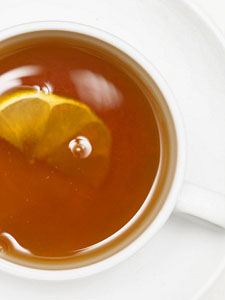Between the Leaves August 2008
Is it true that the tannic acid in tea turns your intestinal tract to leather, causes cancer, and reduces iron absorption? I like tea...but not that much!

I'll admit, I had never heard that tea could 'leatherize' a person's innards. Fifteen minutes on Google, however, turned up several variations of an 'urban legend' wherein American respondents to a British ship's SOS arrived too late to find any survivors. All that remained of the passengers were their tea-leathered stomachs bobbing in the waves.
Ghastly...and impossible. Even if you ignore the logistics of what it would take for a stomach to spontaneously inflate and escape the body, you still have the fact that many nations have been drinking tea for as long as they've had a recorded history and have yet to see a stomach turn into a soccer ball. There is, of course, a very good reason for this: tea does not contain tannic acid.
What we know as tannic acid is a commercial preparation made of several different polyphenols classed as tannins, all of which can interact with proteins to shrink or remove them from solution. Tea does contain certain polyphenols based on gallic acid that belong to this class, such as the famous epigallocatechin 3-gallate (EGCG) and other catechins. However, most of tea's tannic polyphenols are not among those found in commercial tannic acid. Those that are, such as gallic acid, do not occur freely in fresh tea extracts, white, or green tea and are at practically negligible concentrations in oxidized teas. Even with a lifetime of drinking many cups of tea a day, it would be impossible to turn any part of your intestinal tract into leather.
Like the leather story, the claim that tannic acid may cause cancer is also largely the stuff of legend. Between the early 1970s and 90s, an economic botanist at the University of Miami, Dr. Julia Morton, published papers correlating tannins in various plants with endemic cancers. One of her focuses happened to be tea and esophageal cancer in some parts of Japan. Dr. Morton's research gained a certain level of pop culture recognition in 1987 after the New York Times published an article placing her work next to the statement "The tannins in tea may also be carcinogenic". However, there is now an astonishingly wide array of contemporary research that indicates that EGCG and other tea tannins actually have an inhibitory effect on cancers. Moreover, proper tannic acid has also been used as an actual treatment for cancers like cholangiocarcinoma, an incurable cancer of the bile ducts. Clearly neither tea nor tannic acid are considered high on the list of potential carcinogens.
You are, however, correct on the last count. Nearly all tannins have some affinity towards iron and can prevent its uptake. However, it is very unlikely that drinking even absurdly large quantities of tea will send you to the hospital with iron issues. See, dietary iron is classed as either heme iron or nonheme iron. Heme iron, or iron associated with a large heme group, is unaffected by tannins. Practically everyone who includes some form of meat in his or her diet will not have to worry about tea-induced iron deficiency. It is also low on the worry list for vegans and vegetarians as both citric acid and calcium greatly minimize the tannin group's affinity for iron: a squeeze of lemon or a dash of milk instantly solves the problem. Tea purists can avoid such 'contaminants' just by consuming more iron, something as simple as choosing a spinach or chard salad over one made with lettuce. Of course, these guidelines are just generals. If you do have issues with iron, consult with your doctor before indulging in anything more than the occasional cup. Barring that, set aside your worries and pick up your teapot!
